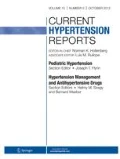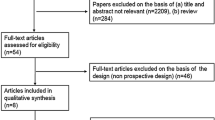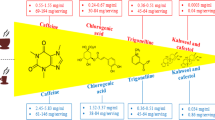Abstract
The relationship between blood pressure (BP) and coffee is of major interest given its widespread consumption and the public health burden of high BP. Yet, there is no specific recommendation regarding coffee intake in existing hypertension guidelines. The lack of a definitive understanding of the BP-coffee relationship is partially attributable to issues that we discuss in this review, issues such as acute vs. chronic effects, genetic and smoking effect modifications, and coffee vs. caffeine effects. We also present evidence from meta-analyses of studies on the association of BP with coffee intake. The scope of this review is limited to the latest advances published with a specific focus on caffeine, acknowledging that caffeine is only one among numerous components in coffee that may influence BP. Finally, considering the state of the research, we propose a mechanism by which the CYP1A2 gene and enzyme influence BP via inhibition of the adenosine receptor differentially in smokers and non-smokers.

Similar content being viewed by others
References
Papers of particular interest, published recently, have been highlighted as: • Of importance •• Of major importance
Tea, Coffee, and Cocoa. Br Med J. 1894;1:640-1. doi:10.1136/bmj.1.1734.640.
Mancia G, Laurent S, Agabiti-Rosei E, Ambrosioni E, Burnier M, Caulfield MJ, et al. Reappraisal of European guidelines on hypertension management: a European Society of Hypertension Task Force document. Blood Press. 2009;18:308–47.
Chobanian AV, Bakris GL, Black HR, Cushman WC, Green LA, Izzo Jr JL, et al. Seventh report of the Joint National Committee on Prevention, Detection, Evaluation, and Treatment of High Blood Pressure. Hypertension. 2003;42:1206–52.
Mancia G, Fagard R, Narkiewicz K, Redon J, Zanchetti A, Bohm M, et al. 2013 ESH/ESC Guidelines for the management of arterial hypertension: the Task Force for the management of arterial hypertension of the European Society of Hypertension (ESH) and of the European Society of Cardiology (ESC). J Hypertens. 2013;31:1281–357.
James PA, Oparil S, Carter BL, Cushman WC, Dennison-Himmelfarb C, Handler J, et al. 2014 evidence-based guideline for the management of high blood pressure in adults: report from the panel members appointed to the Eighth Joint National Committee (JNC 8). JAMA. 2014;311:507–20.
Bohn SK, Ward NC, Hodgson JM, Croft KD. Effects of tea and coffee on cardiovascular disease risk. Food Funct. 2012;3:575–91.
Chou TM, Benowitz NL. Caffeine and coffee: effects on health and cardiovascular disease. Comp Biochem Physiol C Pharmacol Toxicol Endocrinol. 1994;109:173–89.
Frary CD, Johnson RK, Wang MQ. Food sources and intakes of caffeine in the diets of persons in the United States. J Am Diet Assoc. 2005;105:110–3.
Fredholm BB APIJ, Jacobson KA, Klotz KN, Linden J. International Union of Pharmacology. XXV. Nomenclature and classification of adenosine receptors. Pharmacol Rev. 2001;53:527–52.
Wilcox CS, Welch WJ, Schreiner GF, Belardinelli L. Natriuretic and diuretic actions of a highly selective adenosine A1 receptor antagonist. J Am Soc Nephrol. 1999;10:714–20.
Djordjevic N, Ghotbi R, Bertilsson L, Jankovic S, Aklillu E. Induction of CYP1A2 by heavy coffee consumption in Serbs and Swedes. Eur J Clin Pharmacol. 2008;64:381–5.
Kalow W, Tang BK. Caffeine as a metabolic probe: exploration of the enzyme-inducing effect of cigarette smoking. Clin Pharmacol Ther. 1991;49:44–8.
Ghotbi R, Christensen M, Roh HK, Ingelman-Sundberg M, Aklillu E, Bertilsson L. Comparisons of CYP1A2 genetic polymorphisms, enzyme activity and the genotype-phenotype relationship in Swedes and Koreans. Eur J Clin Pharmacol. 2007;63:537–46.
Tunnicliffe JM, Eller LK, Reimer RA, Hittel DS, Shearer J. Chlorogenic acid differentially affects postprandial glucose and glucose-dependent insulinotropic polypeptide response in rats. Appl Physiol Nutr Metab. 2011;36:650–9.
Svilaas A, Sakhi AK, Andersen LF, Svilaas T, Strom EC, Jacobs DR, et al. Intakes of antioxidants in coffee, wine, and vegetables are correlated with plasma carotenoids in humans. J Nutr. 2004;134(3):562–7.
Bonita JS, Mandarano M, Shuta D, Vinson J. Coffee and cardiovascular disease: in vitro, cellular, animal, and human studies. Pharmacol Res. 2007;55:187–98.
Rustan AC, Halvorsen B, Huggett AC, Ranheim T, Drevon CA. Effect of coffee lipids (cafestol and kahweol) on regulation of cholesterol metabolism in HepG2 cells. Arterioscler Thromb Vasc Biol. 1997;17:2140–9.
Freedman ND, Park Y, Abnet CC, Hollenbeck AR, Sinha R. Association of coffee drinking with total and cause-specificmortality. N Engl J Med. 2012;366:1891–904. In this very large prospective study, coffee consumption was inversely associated with total and cause-specificmortality. Causality remained to be determined.
Jee SH, He J, Whelton PK, Suh I, Klag MJ. The effect of chronic coffee drinking on blood pressure: a meta-analysis of controlled clinical trials. Hypertension. 1999;33:647–52.
Noordzij M, Uiterwaal CS, Arends LR, Kok FJ, Grobbee DE, Geleijnse JM. Blood pressure response to chronic intake of coffee and caffeine: a meta-analysis of randomized controlled trials. J Hypertens. 2005;23:921–8.
Zhang Z, Hu G, Caballero B, Appel L, Chen L. Habitual coffee consumption and risk of hypertension: a systematic review and meta-analysis of prospective observational studies. Am J Clin Nutr. 2011;93:1212–9.
Steffen M, Kuhle C, Hensrud D, Erwin PJ, Murad MH. The effect of coffee consumption on blood pressure and the development of hypertension: a systematic review and meta-analysis. J Hypertens. 2012;30:2245–54. This meta-analysis pooled ten randomized controlled trials and five cohort studies to assess the effect of chronic coffee consumption on BP and the development of hypertension. Low-quality evidence did not show any statistically significant effect of coffee consumption on BP or the risk of hypertension.
Mesas AE, Leon-Munoz LM, Rodriguez-Artalejo F, Lopez-Garcia E. The effect of coffee on blood pressure and cardiovascular disease in hypertensive individuals: a systematic review and meta-analysis. Am J Clin Nutr. 2011;94:1113–26.
James JE. Critical review of dietary caffeine and blood pressure: a relationship that should be taken more seriously. Psychosom Med. 2004;66:63–71.
Robertson D, Wade D, Workman R, Woosley RL, Oates JA. Tolerance to the humoral and hemodynamic effects of caffeine in man. J Clin Invest. 1981;67:1111–7.
Klag MJ, Wang NY, Meoni LA, Brancati FL, Cooper LA, Liang KY, et al. Coffee intake and risk of hypertension: the Johns Hopkins precursors study. Arch Intern Med. 2002;162:657–62.
Winkelmayer WC, Stampfer MJ, Willett WC, Curhan GC. Habitual caffeine intake and the risk of hypertension in women. JAMA. 2005;294:2330–5.
Uiterwaal CS, Verschuren WM, Bueno-de-Mesquita HB, Ocke M, Geleijnse JM, Boshuizen HC, et al. Coffee intake and incidence of hypertension. Am J Clin Nutr. 2007;85:718–23.
Bertrand CA, Pomper I, Hillman G, Duffy JC, Micheli I. No relation between coffee and blood pressure. NEJM. 1978;299:315–6.
Lang T, Degoulet P, Aime F, Fouriaud C, Jacquinet-Salord MC, Laprugne J, et al. Relation between coffee drinking and blood pressure: analysis of 6,321 subjects in the Paris region. Am J Cardiol. 1983;52:1238–42.
Stensvold I, Tverdal A, Foss OP. The effect of coffee on blood lipids and blood pressure. Results from a Norwegian cross-sectional study, men and women, 40-42 years. J Clin Epidemiol. 1989;42(9):877–84.
Kodavali L, Townsend RR. Alcohol and its relationship to blood pressure. Curr Hypertens Rep. 2006;8:338–44.
El-Sohemy A, Cornelis MC, Kabagambe EK, Campos H. Coffee, CYP1A2 genotype and risk of myocardial infarction. Genes Nutr. 2007;2:155–6.
Guessous I, Dobrinas M, Kutalik Z, Pruijm M, Ehret G, Maillard M, et al. Caffeine intake and CYP1A2 variants associated with high caffeine intake protect non-smokers from hypertension. Hum Mol Genet. 2012;21:3283–92. Four observational and one quasi-experimental studies including European adults were conducted to explore of CYP1A2 variants and CYP1A2 enzyme activity on blood pressure, focusing on caffeine as the potential mediator of CYP1A2 effects. CYP1A2 variants were associated with hypertension in non-smokers, but not in smokers. Higher CYP1A2 activity was linearly associated with lower blood pressure after quitting smoking. In non-smokers, the CYP1A2 variants were associated with higher reported caffeine intake, which in turn was associated with lower odds of hypertension and lower blood pressure. These observational and quasi-experimental results strongly support a causal role of CYP1A2 in BP control via caffeine intake.
Laitala VS, Kaprio J, Silventoinen K. Genetics of coffee consumption and its stability. Addiction. 2008;103:2054–61.
Yang A, Palmer AA, de Wit H. Genetics of caffeine consumption and responses to caffeine. Psychopharmacology (Berl). 2010;211:245–57.
Cornelis MC, El-Sohemy A, Campos H. Genetic polymorphism of the adenosine A2A receptor is associated with habitual caffeine consumption. Am J Clin Nutr. 2007;86:240–4.
Cornelis MC, Monda KL, Yu K, Paynter N, Azzato EM, Bennett SN, et al. Genome-Wide Meta-Analysis Identifies Regions on 7p21 (AHR) and 15q24 (CYP1A2) As Determinants of Habitual Caffeine Consumption. PLoS Genet. 2011;7:e1002033. This is the first genome-wide association study of habitual caffeine intake. Two loci achieved genome-wide significance: 7p21 near AHR, and 15q24 between CYP1A1 and CYP1A2.
Rao Y, Hoffmann E, Zia M, Bodin L, Zeman M, Sellers EM, et al. Duplications and defects in the CYP2A6 gene: identification, genotyping, and in vivo effects on smoking. Mol Pharmacol. 2000;58:747–55.
Levy D, Ehret GB, Rice K, Verwoert GC, Launer LJ, Dehghan A, et al. Genome-wide association study of blood pressure and hypertension. Nat Genet. 2009;41:677–87.
Newton-Cheh C, Johnson T, Gateva V, Tobin MD, Bochud M, Coin L, et al. Genome-wide association study identifies eight loci associated with blood pressure. Nat Genet. 2009;41:666–76.
Zhou SF, Chan E, Zhou ZW, Xue CC, Lai X, Duan W. Insights into the Structure, Function, and Regulation of Human Cytochrome P450 1A2. Curr Drug Metab. 2009;10:713–29.
Djordjevic N, Ghotbi R, Jankovic S, Aklillu E. Induction of CYP1A2 by heavy coffee consumption is associated with the CYP1A2–163C > A polymorphism. Eur J Clin Pharmacol. 2010;66:697–703.
Landi MT, Sinha R, Lang NP, Kadlubar FF. Human cytochrome P4501A2. IARC Sci Publ. 1999;148:173-95.
Dobrinas M, Cornuz J, Pedrido L, Eap CB. Influence of cytochrome P450 oxidoreductase genetic polymorphisms on CYP1A2 activity and inducibility by smoking. Pharmacogenet Genomics. 2012;22:143–51.
Dobrinas M, Cornuz J, Eap CB. Pharmacogenetics of CYP1A2 activity and inducibility in smokers and exsmokers. Pharmacogenet Genomics. 2013;23:286–92. doi:10.1097/FPC.0b013e3283602e75.
Gunes A, Dahl ML. Variation in CYP1A2 activity and its clinical implications: influence of environmental factors and genetic polymorphisms. Pharmacogenomics. 2008;9:625–37.
Ingelman-Sundberg M, Sim SC, Gomez A, Rodriguez-Antona C. Influence of cytochrome P450 polymorphisms on drug therapies: pharmacogenetic, pharmacoepigenetic and clinical aspects. Pharmacol Ther. 2007;116:496–526.
Nakajima M, Yokoi T, Mizutani M, Kinoshita M, Funayama M, Kamataki T. Genetic polymorphism in the 5'-flanking region of human CYP1A2 gene: effect on the CYP1A2 inducibility in humans. J Biochem. 1999;125:803–8.
Sachse C, Brockmoller J, Bauer S, Roots I. Functional significance of a C– > A polymorphism in intron 1 of the cytochrome P450 CYP1A2 gene tested with caffeine. Br J Clin Pharmacol. 1999;47:445–9.
Jiang Z, Dragin N, Jorge-Nebert LF, Martin MV, Guengerich FP, Aklillu E, et al. Search for an association between the human CYP1A2 genotype and CYP1A2 metabolic phenotype. Pharmacogenet Genomics. 2006;16:359–67.
Dobrinas M, Cornuz J, Oneda B, Kohler Serra M, Puhl M, Eap CB. Impact of smoking, smoking cessation, and genetic polymorphisms on CYP1A2 activity and inducibility. Clin Pharmacol Ther. 2011;90:117–25.
Sulem P, Gudbjartsson DF, Geller F, Prokopenko I, Feenstra B, Aben KK, et al. Sequence variants at CYP1A1-CYP1A2 and AHR associate with coffee consumption. Hum Mol Genet. 2011;20:2071–7.
Alsene K, Deckert J, Sand P, de Wit H. Association between A2a receptor gene polymorphisms and caffeine-induced anxiety. Neuropsychopharmacology. 2003;28:1694–702.
Bochud M. On the use of Mendelian randomization to infer causality in observational epidemiology. Eur Heart J. 2008;29:2456–7.
Padmanabhan S, Melander O, Johnson T, Di Blasio AM, Lee WK, Gentilini D, et al. Genome-wide association study of blood pressure extremes identifies variant near UMOD associated with hypertension. PLoS Genet. 2010;6:e1001177.
Bochud M, Chiolero A, Elston RC, Paccaud F. A cautionary note on the use of Mendelian randomization to infer causation in observational epidemiology. Int J Epidemiol. 2008;37:414–6.
Zhou SF, Yang LP, Zhou ZW, Liu YH, Chan E. Insights into the substrate specificity, inhibitors, regulation, and polymorphisms and the clinical impact of human cytochrome P450 1A2. AAPS J. 2009;11:481–94.
Lopez-Garcia E, Rodriguez-Artalejo F, Rexrode KM, Logroscino G, Hu FB, van Dam RM. Coffee consumption and risk of stroke in women. Circulation. 2009;119:1116–23.
Gloess N, Schönächler B, Klopprogge B, D‘Ambrosio L, Chatelain K, Bongartz A, et al. Comparison of nine common coffee extraction methods: instrumental and sensory analysis. Eur Food Res Technol. 2013;236:607–27.
McCusker RR, Fuehrlein B, Goldberger BA, Gold MS, Cone EJ. Caffeine content of decaffeinated coffee. J Anal Toxicol. 2006;30:611–3.
Del Coso J, Munoz G, Munoz-Guerra J. Prevalence of caffeine use in elite athletes following its removal from the World Anti-Doping Agency list of banned substances. Appl Physiol Nutr Metab. 2011;36:555–61.
Faber MS, Jetter A, Fuhr U. Assessment of CYP1A2 activity in clinical practice: why, how, and when? Basic Clin Pharmacol Toxicol. 2005;97:125–34.
Fuhr U, Rost KL. Simple and reliable CYP1A2 phenotyping by the paraxanthine/caffeine ratio in plasma and in saliva. Pharmacogenetics. 1994;4:109–16.
Nussberger J, Mooser V, Maridor G, Juillerat L, Waeber B, Brunner HR. Caffeine-induced diuresis and atrial natriuretic peptides. J Cardiovasc Pharmacol. 1990;15:685–91.
Passmore AP, Kondowe GB, Johnston GD. Renal and cardiovascular effects of caffeine: a dose-response study. Clin Sci (Lond). 1987;72:749–56.
Rieg T, Steigele H, Schnermann J, Richter K, Osswald H, Vallon V. Requirement of intact adenosine A1 receptors for the diuretic and natriuretic action of the methylxanthines theophylline and caffeine. J Pharmacol Exp Ther. 2005;313:403–9.
Knight RJ, Bowmer CJ, Yates MS. The diuretic action of 8-cyclopentyl-1,3-dipropylxanthine, a selective A1 adenosine receptor antagonist. Br J Pharmacol. 1993;109:271–7.
Brater DC, Kaojarern S, Chennavasin P. Pharmacodynamics of the diuretic effects of aminophylline and acetazolamide alone and combined with furosemide in normal subjects. J Pharmacol Exp Ther. 1983;227:92–7.
van Buren M, Bijlsma JA, Boer P, van Rijn HJ, Koomans HA. Natriuretic and hypotensive effect of adenosine-1 blockade in essential hypertension. Hypertension. 1993;22:728–34.
Bochud M, Staessen JA, Maillard M, Mazeko MJ, Kuznetsova T, Woodiwiss A, et al. Ethnic differences in proximal and distal tubular sodium reabsorption are heritable in black and white populations. J Hypertens. 2009;27:606–12.
Biaggioni I, Paul S, Puckett A, Arzubiaga C. Caffeine and theophylline as adenosine receptor antagonists in humans. J Pharmacol Exp Ther. 1991;258:588–93.
Modlinger PS, Welch WJ. Adenosine A1 receptor antagonists and the kidney. Curr Opin Nephrol Hypertens. 2003;12:497–502.
Welch WJ. Adenosine A1 receptor antagonists in the kidney: effects in fluid-retaining disorders. Curr Opin Pharmacol. 2002;2:165–70.
Tang Z, Diamond MA, Chen JM, Holly TA, Bonow RO, Dasgupta A, et al. Polymorphisms in adenosine receptor genes are associated with infarct size in patients with ischemic cardiomyopathy. Clin Pharmacol Ther. 2007;82:435–40.
Shively CA, Tarka Jr SM, Arnaud MJ, Dvorchik BH, Passananti GT, Vesell ES. High levels of methylxanthines in chocolate do not alter theobromine disposition. Clin Pharmacol Ther. 1985;37:415–24.
Bruinsma K, Taren DL. Chocolate: food or drug? J Am Diet Assoc. 1999;99:1249–56.
Mahmud A, Feely J. Acute effect of caffeine on arterial stiffness and aortic pressure waveform. Hypertension. 2001;38:227–31.
Karatzis E, Papaioannou TG, Aznaouridis K, Karatzi K, Stamatelopoulos K, Zampelas A, et al. Acute effects of caffeine on blood pressure and wave reflections in healthy subjects: should we consider monitoring central blood pressure? Int J Cardiol. 2005;98:425–30.
Acknowledgments
This work was supported by the Swiss National Science Foundation FN 33CM30-124087and FN 33CM30-140331.
Compliance with Ethics Guidelines
ᅟ
Conflict of Interest
Idris Guessous has received a grant from the Swiss National Science Foundation.
Chin B. Eap has received a grant from Roche Organ Transplantation Research Foundation and Takeda and payment for development of educational presentations from Advisis, Astra Zeneca, Essex Chemie, Lundbeck, Merck Sharp & Dohme, Sandoz, Servier, and Vifor-Pharma.
Murielle Bochud has received a grant from the Swiss National Science Foundation.
Human and Animal Rights and Informed Consent
This article does not contain any studies with human or animal subjects performed by any of the authors.
Author information
Authors and Affiliations
Corresponding author
Additional information
This article is part of the Topical Collection on Blood Pressure Monitoring and Management
Rights and permissions
About this article
Cite this article
Guessous, I., Eap, C.B. & Bochud, M. Blood Pressure in Relation to Coffee and Caffeine Consumption. Curr Hypertens Rep 16, 468 (2014). https://doi.org/10.1007/s11906-014-0468-2
Published:
DOI: https://doi.org/10.1007/s11906-014-0468-2




